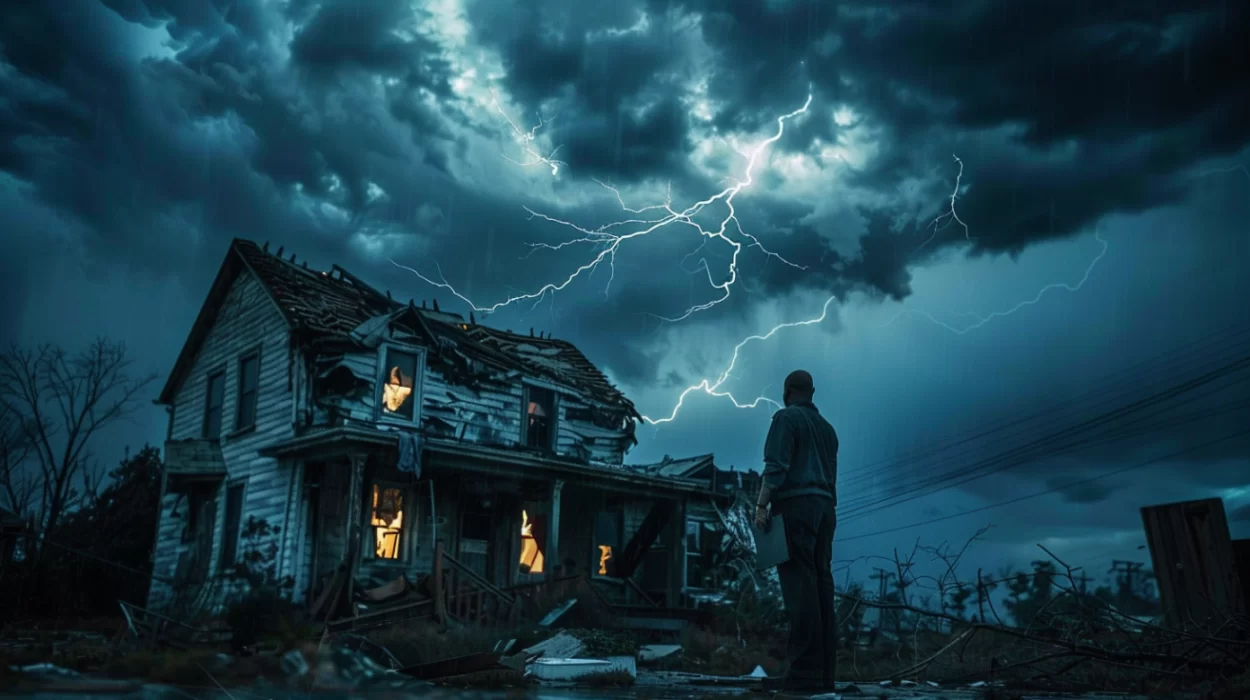Table of Contents
Visible Signs Of Lightning Strike Damage
With a single glance, you can determine if your house has been hit by lightning by looking for visible signs of damage on the exterior. You’ll notice scorch marks, blackened areas, or burn marks on the roof, walls, or chimneys.
These marks can be a clear indication that lightning has struck your house. You might also see broken or shattered windows, damaged siding, or blown-out electrical outlets.
Take a closer look at the roof and check for missing, damaged, or loose shingles. If you notice any of these signs, it’s essential to inspect the interior of your house as well. Check for damage to walls, ceilings, and floors, and look for signs of fire or smoke.
#1: Unusual Electrical Issues
Lightning strikes can also wreak havoc on your home’s electrical system, even if the exterior damage is minimal or not visible. You may notice unusual electrical issues, such as flickering lights, dimming or brightening of lights, or lights that won’t turn off. Your appliances may malfunction or not work at all. You may also experience power surges or electrical shocks when touching metal objects like doorknobs or faucets.
If your home has been struck by lightning, you may notice that your circuit breakers trip frequently or your outlets feel warm to the touch. These issues can be a sign that your home’s electrical system has been compromised and needs to be inspected and repaired by a licensed electrician as soon as possible.
#2: Marks On Roof Or Siding
Numerous signs can indicate that your house has been struck by lightning, and one of the most visible is the presence of marks on your roof or siding. If lightning has struck your house, you’ll likely notice scorch marks, burn marks, or charred areas on your roof or siding.
These marks can be small or large, and they might be circular or irregularly shaped. You might also see melted or deformed roofing materials, such as shingles or metal, or damaged siding, including vinyl, brick, or stucco.
If you notice any of these marks, don’t ignore them. Take a closer look and inspect your roof and siding thoroughly to determine the extent of the damage. It’s essential to address lightning damage promptly to prevent further harm to your home.
#3: Burning Smells Or Odors
As you step inside your house after a lightning storm, a pungent aroma might hit you, indicating that your home has been struck. You notice a burning smell or odor that’s similar to ozone or charred wood. This smell is often a sign that lightning has ignited wood or other flammable materials in your home.
Take this smell seriously, as it could indicate a hidden fire. Investigate the source of the smell immediately. Check your attic, walls, and floors for any signs of smoke or fire damage. If you can’t find the source, don’t hesitate to call the fire department or a professional to help you assess the situation.
#4: Disrupted Electrical Systems
Your home’s electrical system is a prime target for lightning damage. If your house has been struck, you’ll likely notice disruptions to your electrical systems. You might experience flickering lights, blown fuses, or tripped circuit breakers. Your appliances may malfunction or fail to turn on. In some cases, the electrical system may shut down entirely, leaving you without power.
Check your electrical panel for signs of damage, such as burn marks, melted wiring, or broken fuses. If you suspect electrical damage, don’t try to fix it yourself. Call a licensed electrician to assess the damage and make necessary repairs. They’ll ensure your electrical system is safe and functioning properly. Electrical damage can be a fire hazard, so address the issue promptly.
Final Thoughts
You’ve checked your house for signs of a lightning strike, and now it’s time to take action. If you’ve found any visible damage, unusual electrical issues, or suspicious burning smells, don’t wait – call a licensed electrician to inspect your home. Your safety depends on it. A prompt inspection can identify potential hazards and prevent further damage. Don’t risk your safety; get your home checked out as soon as possible.
Frequently Asked Questions (FAQ)
Can A House Still Be Occupied After A Lightning Strike?
You'll need to exercise extreme caution, but you can still occupy your house after a lightning strike. However, you'll want to ensure that a licensed electrician thoroughly inspects your home's electrical system for damage first.
Do All Lightning Strikes Cause House Fires?
You might assume all lightning strikes cause house fires, but that's not true. You'll find that most strikes don't ignite a fire; however, they can still cause significant electrical and structural damage to your home.
Can I Inspect for Lightning Damage Myself?
You can inspect for lightning damage yourself, but it's not recommended. You'll likely miss subtle signs of damage, and safety risks like electrical shock or structural instability might put you in harm's way, so consider hiring a pro.
Are All Lightning Strikes To a House Immediately Noticeable?
You won't always notice if lightning strikes your house; some effects can be subtle or delayed. You mightn't see damage right away, but you'll likely hear the strike or smell smoke if it's a direct hit.
Does Homeowners Insurance Cover Lightning Strikes?
You're probably wondering if homeowners insurance covers lightning strikes - and the answer is yes, it typically does. You'll want to review your policy to confirm, but most standard policies cover damage from lightning strikes.
